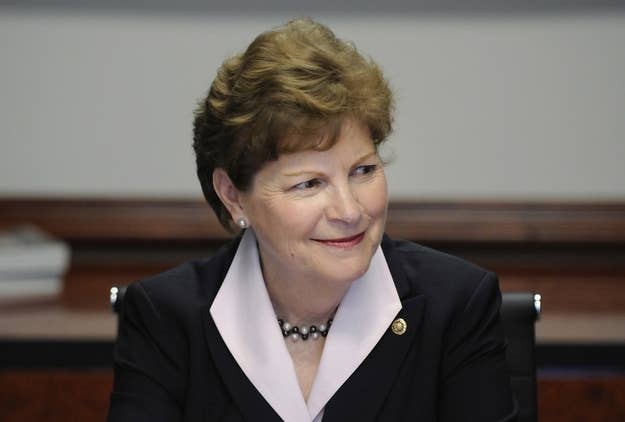
Sen. Jeanne Shaheen is pushing forward with legislation aimed at providing equal benefits for gay and lesbian married service members and veterans, planning to testify Wednesday before the Senate Veterans' Affairs Committee in support of the Charlie Morgan Act.
The Defense of Marriage Act, as well as a few veterans-specific laws, prevent the wife of Chief Warrant Officer Charlie Morgan, who died in February, from receiving equal benefits. Shaheen's bill, co-sponsored by Sen. Kirsten Gillibrand, aims to fix that.
"I am proud of this country's long-standing commitment to military families. LGBT service members serve openly in our military and we depend on them to keep us safe. Denying their legally recognized spouses equal benefit under the law is unjustified, and un-American," Shaheen plans to tell the committee, according to her prepared testimony, which was provided to BuzzFeed.
Committee Chairman Bernie Sanders has scheduled the hearing to address a variety of pending veterans' benefits issues and bills.
[UPDATE: Wednesday's hearing has been postponed. From the committee spokesman: "This afternoon's scheduled meeting of the Senate Committee on Veterans' Affairs has been postponed. The hearing will be rescheduled." 5/15/13.]
Here is Shaheen's full testimony, as planned for delivery:
Chairman Sanders, Ranking Member Burr, Members of the Senate Committee on Veterans Affairs. I know you have an extremely busy schedule today and will be considering a number of important pieces of legislation dedicated to ensuring that our nation's veterans receive the benefits and care they have earned.
I want to thank you for allowing me an opportunity to speak briefly about one of those bills, namely, the Charlie Morgan Military Spouses Equal Treatment Act, which I introduced along with Senator Gillibrand in February.
The bill would address ongoing discrimination against gay and lesbian members of the military and their families. In particular, it would make a number of critical benefits, including TRICARE access, certain survivor benefits and travel and transportation allowances, available to all military spouses, regardless of sexual orientation.
The repeal of "Don't Ask, Don't Tell" was a monumental achievement for our military and for our country; however, it did not finish the entire job of ensuring that our gay and lesbian service members and their families are treated equally under the law. A number of important family benefits and support programs remain unavailable to same-sex spouses under current law – due to the Defense of Marriage Act and other discriminatory provisions. This bill would help ensure equality in military and veterans' benefits for all of our nation's military spouses.
I am certain the Committee will get into all of the various details on each of the benefits affected by this legislation, but today, I want to share with you a real life story of a true hero whose life was impacted by this inequitable policy. The bill before you is named after Charlie Morgan, a New Hampshire National Guard Chief Warrant Officer, who sadly passed away earlier this year after a courageous battle with breast cancer.
Charlie garnered national attention when she was one of the first service members to publically confirm her homosexuality soon after the repeal of "Don't Ask, Don't Tell." However, Charlie was first and foremost a soldier dedicated to defending her country.
She enlisted in the United States Army in 1982. After a brief period away, Charlie returned to service as a member of the Kentucky National Guard in 1992. Following the terrorist attacks of September 11, 2001, Charlie returned for a third time, joining the 197th Fires Brigade of the New Hampshire National Guard, a tour that included a year-long deployment in Kuwait.
Throughout her long career of service to our nation, she shouldered the incredible burden of keeping her life secret from her fellow soldiers. Married to her partner Karen in 2000, Charlie was unable to live openly under the "Don't Ask, Don't Tell" policy. In addition, despite enduring the same hardships as any other military family, Charlie and her wife were unable to take advantage of many of the same support programs that are so essential to the health and well-being of military families.
Soon after "Don't Ask, Don't Tell" was repealed, Charlie came out publicly and began the fight to pursue equal benefits for same-sex spouses, benefits she and her family had earned as much as any other military member.
This was not an abstract issue for Charlie. She was diagnosed with breast cancer in 2011, and knew that her time was limited. Concerned for the future well-being of her family, Charlie took aim at DOMA by challenging its constitutionality in federal court. Her case will be decided by the Supreme Court later this year.
Unfortunately, Charlie will not be able to see her final day in court. She passed away earlier this year. Charlie Morgan epitomized courage – in her military service, her fight for LGBT equality and in her battle with cancer.
I introduced this legislation in honor of Charlie's memory. Every individual that provides for our defense deserves the peace of mind that comes with knowing one's family will be taken care of should the worst happen.
I am proud of this country's long-standing commitment to military families. LGBT service members serve openly in our military and we depend on them to keep us safe. Denying their legally recognized spouses equal benefit under the law is unjustified, and un-American.
No one should ever again go through what Charlie and her family had to go through. I hope my colleagues on this Committee will act quickly to address this issue by passing the Charlie Morgan Military Spouses Equal Treatment Act and sending it to the floor for its consideration.
